 About the campaign
About the campaign
Medicines waste is a vital issue to the NHS, but the general public are often not aware of the full scale. When medicines are requested inaccurately (by people or their representatives), waste accumulates that inconveniences people, poses a safety risk and contributes to medicines shortages. These are real issues seen on a day-to-day basis across our health system and felt by our population.
Alongside the financial impact, there is also the environmental cost from medicines that are prescribed but not taken, through both the waste of the medicine itself and the wasted resource to produce and supply the medicine. We must ensure resources are used wisely and where they are most needed, this includes a substantial amount of staffing time particularly for the prescription clerk and pharmacy teams.
Medicines waste is complex and due to a variety of reasons, of which not all are avoidable. However, we can all make small contributions to the factors within our control which combine to make a significant difference, starting with only ordering what we need.
Environmental impacts
25% of the NHS carbon footprint is related to medicines. Medicines can also contribute to water pollution, plastic waste and air pollution. The NHS is committed to working with the public and its providers to reduce the growing threat to human health posed by climate change and our impacts on the environment. You can read more about this at Greener NHS.
The Partnership has an aspiration to be a leader in the delivery of environmentally sustainable health and social care. The West Yorkshire pharmacy network for sustainability and the environment, which I chair, feel very strongly about reducing medicines waste to help us work towards this ambition. We strive to deliver the highest quality care to people with the lowest environmental impact. Avoidable medicines waste is a key opportunity to reduce the impact on our environment from the life cycle of medicines production, supply and destruction. Unfortunately, medicines are currently not able to be re-used once they have left the pharmacy counter, so it is vital to support people to order only the medicines they need before this happens. Medicines require specific storage conditions to ensure they remain safe, effective and in their original condition. This cannot be guaranteed once out of the pharmacy’s control. There are also national legal frameworks preventing medicines returned to community pharmacies from being re-supplied.
Pharmacy colleagues across West Yorkshire have been working together to reduce medicines waste across healthcare. One element was to commission an independent piece of local research across the region that gave us an insight into people’s behaviours and attitudes towards medicine waste to help inform this work. You can read the report here.
How can partners support the campaign?
It has been great to see this campaign come to fruition and launch across West Yorkshire. We would very much appreciate colleagues and partners supporting wherever possible. You can do this in several ways.
If you work in a health and care setting, a range of promotional materials and supporting information is available to download on the Partnership website. You can also share the campaign online by visiting the Partnership’s pages on Facebook, X (Twitter) and LinkedIn.
For more information and simple steps patients can take to help reduce medicines waste please visit the website wypartnership.co.uk/orderwhatyouneed
Thank you for reading. Have a great weekend.
Costas


 The ‘Only order what you need’ campaign aims to educate patients or those ordering prescriptions on their behalf on the impact of over-ordering and stockpiling prescription medicines.
The ‘Only order what you need’ campaign aims to educate patients or those ordering prescriptions on their behalf on the impact of over-ordering and stockpiling prescription medicines. MY Hospitals Charity achieves national recognition thanks to creative campaigns and community support
MY Hospitals Charity achieves national recognition thanks to creative campaigns and community support Airedale neonatal work shortlisted for national award
Airedale neonatal work shortlisted for national award 
